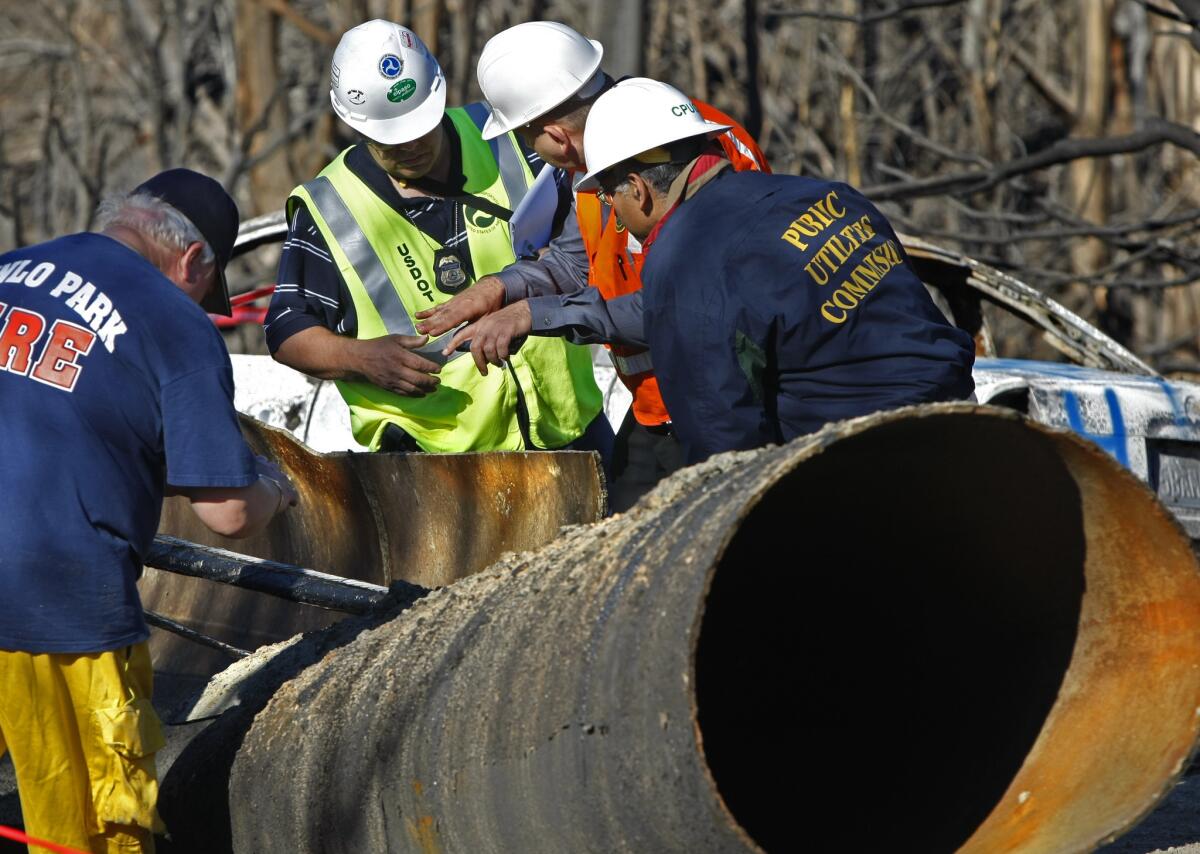State legislators call for drastic overhaul of California’s utility regulator

The 2010 natural gas pipeline explosion in San Bruno prompted close scrutiny of the California Public Utilities Commission.
Reporting from Sacramento — State legislators are calling for a major overhaul of California’s utilities regulator by striking it from the state Constitution and reassigning its sprawling portfolio in the wake of a series of controversies, including the natural gas leak in Aliso Canyon.
Assemblyman Mike Gatto (D-Los Angeles) said his measure would decentralize the California Public Utilities Commission’s oversight of myriad utilities, including electricity, railroad safety and ride-sharing companies such as Uber and Lyft.
“After hearing about how the clear warnings of the impending Aliso Canyon gas leak were lost in the shuffle, I concluded that we need to rethink the way we regulate utilities in the state,” Gatto said at a news conference Wednesday in Sacramento. “It’s the opposite of too big to fail. Our concern is that the CPUC is too big to succeed.”
The proposal by Gatto, chairman of the Assembly’s utilities committee, would give the Legislature two years to divvy up the functions of the commission among other agencies, which Gatto said would result in a more logical assignment of responsibilities.
Terrie Prosper, spokeswoman for the PUC, said the commission has taken steps toward reform in the last year.
“But there is still much to do, and we look forward to working with the Legislature on any constructive and helpful reform initiative that is put forward,” she said in a statement. “Only by working together on real changes that have the ability to succeed can we make the CPUC stronger and more efficient, and our relationship with the Legislature more productive.”
Calls for restructuring the commission have grown louder after events in San Bruno, San Onofre and now Porter Ranch.
An underground well at the Aliso Canyon storage field owned by Southern California Gas Co., a subsidiary of San Diego-based Sempra Energy, has been spewing thousands of tons of natural gas into the skies above the San Fernando Valley since October.
Thousands of residents have been forced from their homes because of headaches, nosebleeds and other health effects.
Meanwhile, the commission’s response to the San Bruno pipeline explosion in 2010 and the 2012 closure of the San Onofre Nuclear Generating Station have become the subjects of criminal investigations by state and federal prosecutors.
The San Bruno disaster, which left eight people dead and dozens injured, led to closer scrutiny of the regulators’ cozy relationships with the pipeline’s owner, PG&E, and the state launched an investigation into allegations of improper back-channel communications between former commission President Michael Peevey and PG&E officials.
Peevey is also under investigation for his role in the shutdown of the San Onofre nuclear power plant.
“The recent history of the PUC has been riddled with questions of the commission’s ability to regulate with the people’s best interests in mind,” said Assemblyman Marc Levine (D-San Rafael), a coauthor of the measure.
When Peevey stepped down in December 2014, Gov. Jerry Brown appointed a former advisor, Michael Picker, to take the helm. Although Picker has pledged to revamp and increase transparency at the commission, lawmakers and advocates say those promises have come up short.
Brown faced an outcry from PUC critics last year when he vetoed a package of transparency bills directed at the agency. He declared some of the proposals to be “unworkable” but promised to work with legislators to address their concerns.
The state Senate approved two similar transparency bills last week.
Eliminating the commission’s constitutional autonomy may face resistance from Brown, who has been loath to cede power of the executive branch’s agencies. But Brown would not need to sign off on the proposal; instead, the Legislature would have to pass it by a two-thirds vote and place it on the November ballot for approval by voters. His office declined to comment.
The two-thirds threshold would be a steep climb for Gatto’s bill, but he said the raft of negative news about the PUC may aid his efforts.
“It’s very hard to find a member of the Legislature whose district has not been affected by some of the recent headlines,” Gatto said.
Consumer advocates said they were leery of doing away with the commission.
Jamie Court, president of Consumer Watchdog in Santa Monica, said he is unlikely to support doing away with the panel.
“It would be a mistake to get rid of an independent constitutional body,” he said. “This should be a wake-up call for the Public Utilities Commission to let the public in and to let the sunlight in.”
Sen. Jerry Hill (D-San Mateo), a longtime commission critic whose district includes San Bruno, said the Gatto proposal merits serious consideration.
“We’ve been working to try and reform the PUC for the last five years, with some success and some failures,” Hill said. “It’s time to start talking about what we want the PUC to look like. The organization has done too many jobs too poorly for too long, and a reorganization is probably overdue.”
Mason reported from Sacramento; McDonald from San Diego.
More to Read
Get the L.A. Times Politics newsletter
Deeply reported insights into legislation, politics and policy from Sacramento, Washington and beyond. In your inbox three times per week.
You may occasionally receive promotional content from the Los Angeles Times.











